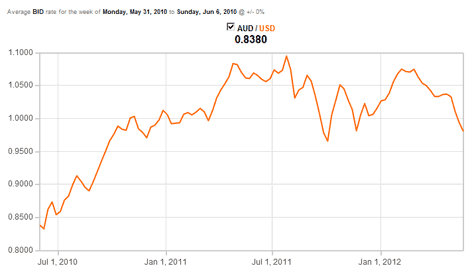Australian dollar needs to fall below 90 US¢ to bring back expat residential property buyers: WBP
The fall in the Australian dollar in the last few months is currently not great enough to encourage expat Australians to invest back in the local residential property market, according to Greville Pabst, chief executive of property valuers and consultants WBP Property Group.
Pabst says a falling Aussie dollar is positive news for expatriates, with the improved conversion rate giving them “greater buying power”.
However, he says the fall in the dollar has been minimal to date and “insufficient to spur a dramatic surge of expatriate investment in the local market”.
“Should the Australian dollar deteriorate to or below 90 cents against the US dollar we expect to see an influx of expatriate buyers,” he says.
“A fall of 10¢ in the dollar (AUD) equates to a saving of $53,500 for expats based on the purchase of a property at Melbourne’s current median house price of $535,000. This is a great incentive in anyone’s eyes.
Expats sometimes buy residential property in Australia as an investment while they live abroad, but often choose to move into the property once they return to Australia.
Yesterday, Property Observer reported that the fall in the dollar would strengthen already strong demand for commercial property from offshore investors.
Pabst says falls in the Australian dollar will also lead to improved affordability in the local education sector for international students, “which will have a positive impact on activity in the property sector”.
A fall in the dollar would be particularly beneficial to Chinese property investors and Chinese international students, with the yuan pegged to the US dollar.
LJ Hooker executive chairman Janusz Hooker says the real estate group is already seeing interest from expats due to the falling dollar and lower house prices.
“On Sydney's north shore last weekend LJ Hooker had an expat fly over from Miami as well as a couple from London looking at local residential property,” he tells Property Observer.
“LJ Hooker has seen a number of expats looking at residential property. Expats are looking at it as a 'now' opportunity.
“A number of experts are split if the dollar will stay below parity, so Australians living overseas with plans to come home, combined with a soft real market over the past 12 months, are very interested,” he says.
The Australian dollar is currently trading at just above 98 US¢.
Since April this year it has declined from around $1.04 against the US dollar to below 98¢, with a more gradual decline commencing from the $1.09 level in February.
Australian dollar versus US dollar since July 2010

Source: XE.com
It reached parity with the US dollar in November 2010 and rose to a 29-year high of $1.108 on July 27 2011 before retreating.
Currently economists are tipping the dollar to fall as low as 95 US¢ due to concerns over Greece exiting the euro, Spanish banks falling in trouble and data showing the Chinese economy is slowing, potentially reducing demand for Australian raw material.
AMP Capital Investors chief economist Shane Oliver says the current fall in the dollar “looks and feels like the pull-back last year when the Aussie dollar went from a high of about $US1.10 in the middle of last year to fall to 94¢.
However, he believes that the currency should trade back to parity or stronger than the US dollar by the end of the year.
A further drop in interest rates could also cause the Australian dollar to fall – Australia’s high interest rates relative to other markets has made the country appealing to global investors who have bought Australian dollars and kept the currency buoyant.